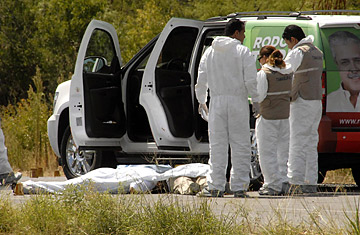
Forensic experts inspect the site in Ciudad Victoria, Mexico, where Rodolfo Torre Cantu, a candidate for governor in the northeastern Mexican state of Tamaulipas, was assassinated on June 28, 2010
Last Friday, June 25, gubernatorial candidate Rodolfo Torre raised both his arms to the sky in front of 15,000 cheering white-shirted supporters in a baseball stadium minutes from the Rio Grande. After he promised security in his violence-ridden border state of Tamaulipas, the crowd erupted to his campaign anthem, sung to the catchy tune of the smash hit "I Gotta Feeling" by U.S. pop band Black Eyed Peas. They had reason for celebration. Opinion polls all concurred that the mustachioed physician would win the July 4 election by a landslide of more than 30 points. But on Monday, as Torre left the state capital to conclude his campaign, assailants showered his convoy with gunfire from automatic rifles and heavy-caliber weapons, killing him instantly. Army commanders said the attack bore all the signs of the Zetas, a paramilitary drug gang that was born in the state.
Mexico's highest-profile political assassination since the 1994 murder of presidential candidate Luis Donaldo Colosio was a blow not only to Torre's supporters but to the nation's entire ailing democracy. On July 4, voters will choose governors in 12 of 31 states in a "Super Sunday" of local elections. The ballots come almost exactly a decade after the nation voted to end 71 years of one-party rule. But rather than showcasing the success of multiparty democracy, the campaigns have highlighted its hazards. Races have been dampened by arrests of candidates on racketeering charges, leaked tapes of organized vote buying and a succession of violent attacks. After the Torre killing, some politicians asked for half of the races to be suspended. "This is extremely worrying," says political scientist Maria Eugenia Valdes. "If there is fear and violence, there is no freedom. And if there is no freedom, we cannot have fair elections."
A key problem is that many of the polls are in the states hardest hit by the relentless drug war, including Chihuahua, home to Ciudad Juárez, which has a reputation for being one of the most dangerous cities in the world, and Sinaloa, the cradle of Mexican organized crime. Tamaulipas, a state that shares a border with Texas and has three of the busiest land cargo-crossing points into the U.S., has this year been engulfed by bloody battles between the Zetas and their old masters in the Gulf cartel. Back in the 1990s, the cartel founded the Zetas, recruiting defectors from the army special forces to be its brutal enforcers. But the Zetas broke away to smuggle their own drugs as well as carry out rampant extortion and kidnapping. The fighting has littered the Tamaulipas streets with hundreds of bodies and led to prolonged shoot-outs that have shut down schools and workplaces.
The Zetas have also suffered — hit heavily by arrests, firefights with the army and the actions of rival gangs in other states, including Sinaloa, where 28 of their alleged members were slaughtered in a prison riot. Such devastating losses could have led them to lash out against the establishment.
The violence in Tamaulipas has scarred all the major political parties. Last month, triggermen silenced a mayoral candidate from the conservative National Action Party (PAN) of President Felipe Calderón, gunning him and his son down in his farm-supplies store in the town of Valle Hermoso. In nearby Nuevo Laredo, assassins wiped out two people close to the mayoral candidate of the leftist Democratic Revolution Party (PRD), then strung up banners warning, "This is what happens to everyone who supports these f______ people." Gubernatorial candidate Torre had been a lifelong member of the centrist Institutional Revolutionary Party (PRI), which currently controls Tamaulipas. While focusing on law and order, the 46-year-old former federal deputy had made no radical or controversial proposals.
As politicians of all stripes rushed to Tamaulipas to condemn the murder, Calderón called for a united front against narco-butchery. "I'm convinced today more than ever that we need dialogue and unity," he said from his presidential palace. "Because together, Mexicans can defeat and will defeat this common enemy, which threatens to destroy not only our tranquillity but also our democratic institutions." Electoral officials said the Tamaulipas election would go on as scheduled, and PRI leaders promised a substitute candidate, saying they would not be intimidated.
However, the campaigns have led to some fierce mudslinging among the parties. When the PRD gubernatorial candidate in the state of Quintana Roo was arrested for allegedly working with the Zetas, party leaders accused the federal government of framing him in a political persecution. Later, following leaked tapes of alleged electoral shenanigans by the PRI, its governors lashed out at the federal government for wiretapping them. PRI Senator Adolfo Toledo then blamed bad blood for creating a hostile environment that was conducive to Monday's murder. "What has happened is terrible, but it is the result of the heated confrontations supported by the PAN and the federal government that finally ended in the first victim," Toledo told TIME.
Voter turnout will be a key barometer of how intimidated the electorate has become, with some likely to stay at home in the same way many avoided the polls in war-torn Iraq and El Salvador. Electoral observers say the intimidation and corruption will probably lead to the courts' ultimately ruling on the results of up to half of the races. "We are seeing more and more elections being decided by judges," says Francisco Abundis of the polling firm Parametria. "That is a very bad sign." Looking ahead, pundits fear that the problems bedeviling these votes may be a mere taste of those that could ravage the country's next presidential election, due in 2012.
— With reporting by Dolly Mascareñas / Oaxaca
